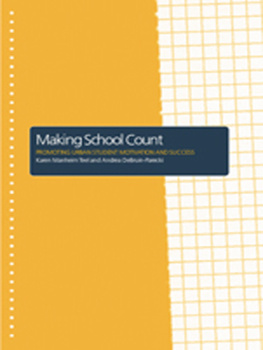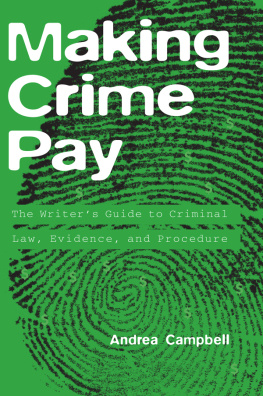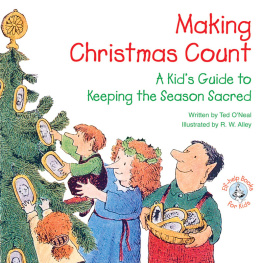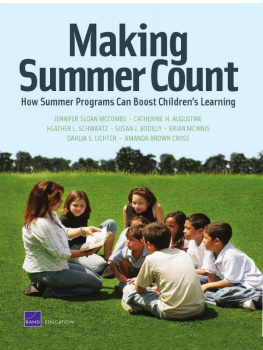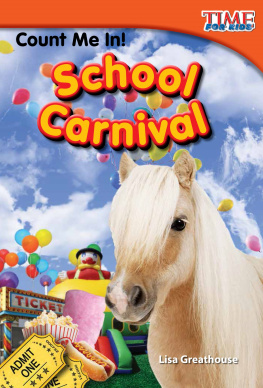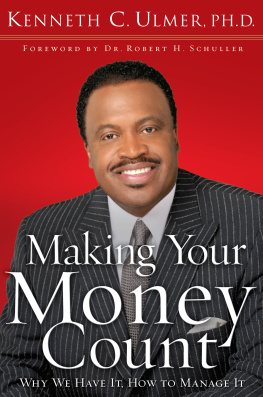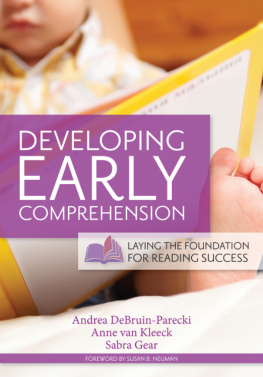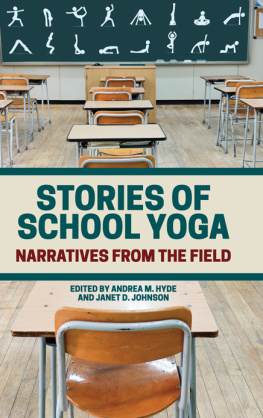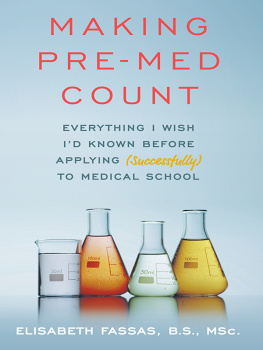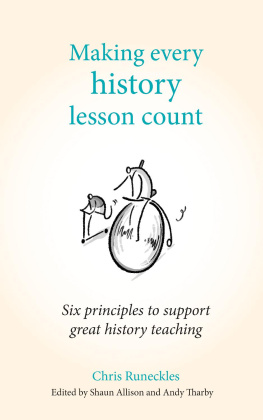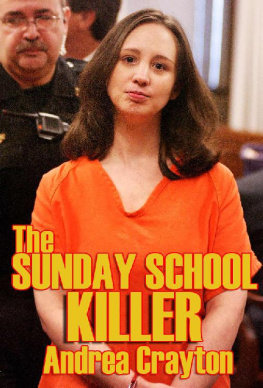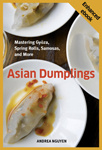Debruin-Parecki Andrea - Making School Count
Here you can read online Debruin-Parecki Andrea - Making School Count full text of the book (entire story) in english for free. Download pdf and epub, get meaning, cover and reviews about this ebook. year: 2001, publisher: Taylor & Francis Group, genre: Religion. Description of the work, (preface) as well as reviews are available. Best literature library LitArk.com created for fans of good reading and offers a wide selection of genres:
Romance novel
Science fiction
Adventure
Detective
Science
History
Home and family
Prose
Art
Politics
Computer
Non-fiction
Religion
Business
Children
Humor
Choose a favorite category and find really read worthwhile books. Enjoy immersion in the world of imagination, feel the emotions of the characters or learn something new for yourself, make an fascinating discovery.
- Book:Making School Count
- Author:
- Publisher:Taylor & Francis Group
- Genre:
- Year:2001
- Rating:5 / 5
- Favourites:Add to favourites
- Your mark:
- 100
- 1
- 2
- 3
- 4
- 5
Making School Count: summary, description and annotation
We offer to read an annotation, description, summary or preface (depends on what the author of the book "Making School Count" wrote himself). If you haven't found the necessary information about the book — write in the comments, we will try to find it.
Making School Count — read online for free the complete book (whole text) full work
Below is the text of the book, divided by pages. System saving the place of the last page read, allows you to conveniently read the book "Making School Count" online for free, without having to search again every time where you left off. Put a bookmark, and you can go to the page where you finished reading at any time.
Font size:
Interval:
Bookmark:

Directions read to interviewees: This is an interview that we do with students at the end of the year to get their thoughts about the class. We do this in order to see if what we did was effective, and also to make changes for next time. Thats why its very important that you answer honestly. Your answers give us very important information. The questions come from the questionnaire you filled out last week.
1 Do you think that your grade in this class is based on different kinds of assignments?
2 Most students said that they were getting higher grades in this class. Why do you think that this is true?
3 Do you think you learn more in your other classes?
4 Why do you think we have class officers? Are there other ways students could take responsibility for the class?
5 Most students said that they felt good about being able to read books about people from their own race. What do you think?
6 Do you like how the class has had discussions about important current events? Why?
7 Give us some thoughts about everything that you think is really good about this class, that you really like, and also things that are bad about this class, compared to your other classes. Things like how the class is run, how the teachers treat you, and some of the things you would really like to change.
1 The harder I work in this class, the better grade I will get.
| TRUE | FALSE |
2 Only some people in this class can get an A.
| TRUE | FALSE |
3 I dont feel comfortable sharing my ideas in this class.
| TRUE | FALSE |
Because:
4 In this class I have been able to improve my grade by re-doing assignments or turning them in late.
| TRUE | FALSE |
If you circled False, please explain your answer:
5 Are you getting a better grade in this class than in most of your other classes?
| YES | NO |
If you are getting a better grade in this class, list as many reasons for this as you can think of below:
6 How do you feel about having choices in the books you read and on some of your assignments?
7 Do you think its a good idea to have classroom officers?
| YES | NO |
Why or why not?
8 Do you have class officers in your other classes?
| YES | NO |
9 How do you feel about being able to read books about people from your own race?
1 At the beginning of the quarter, what grade did you want in this class?
| A | B | C | D | F |
2 Now, with the quarter over, what grade did you actually get in this class on your report card?
| A | B | C | D | F |
Why?
3 What would be a good grade for you in this class? (You can circle more than one grade.)
| A | B | C | D | F |
4 What is the lowest grade you can get in this class and still be proud of your grade?
| A | B | C | D | F |
Why what makes you proud of a grade?
5 What grade does your parent or guardian expect in this class?
| A | B | C | D | F |
6 What is the lowest grade you can get in this class and still stay out of trouble with your parent or guardian?
| A | B | C | D | F |
7 Are you getting a higher grade in this class than in your other classes?
| YES | NO |
If yes, give 3 reasons why:
(1)
(2)
(3)
8 What other thoughts do you have about this class?
1 Check the school-connected skills you like the best :
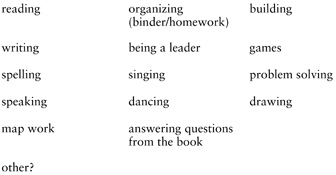
2 Check the school-connected skills you want/need to improve on :
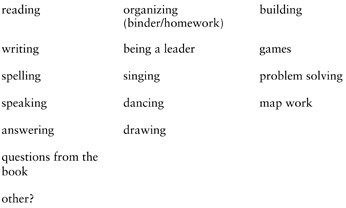
3 Check your interests outside of school :
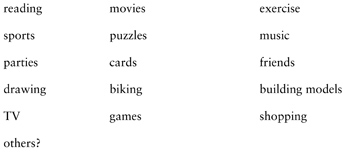
4 List the careers you might be interested in as an adult:
5 what colleges or universities are you interested in?
What stands out for me is the positive rapport that has developed between me and my students at this point. There are moments during class when one or more students are acting silly, flirting, and goofing around, but I can usually redirect their energies. Even with this rapport, though, I continue to be confused about why the students are not getting their work done and turned in and why they dont resubmit their work with corrections. I know they want As but something is getting in their way. I wonder if they know what it is.
(Karens Journal, 12/1/95)
The notes above were the reflections of the first author of this book, Karen Teel, as she pondered her predominantly African American, inner-city students behavior in her eighth grade US History class and how she could convince them to do their very best, thereby making school count. As she says in these notes, there are clearly many forces at work, often elusive to teachers (and maybe to the students themselves), which undermine student motivation and learning and which determine student achievement in school.
In an attempt to understand better those elusive forces and to discover the keys to high achievement for this student population, a four-year classroom study was undertaken (19902 and 1994 6). Our book is based on that study, during which Karen used and collaboratively evaluated alternative teaching strategies designed to honor and motivate low-achieving, inner-city, African American middle school students. When we use the term low-achieving or low achievement in this book, we are referring to low academic success as determined by teacher evaluations, grades received, and test scores. We put quotes around these labels because we believe that those students who are considered to be low-achieving based on traditional teaching criteria for success and standardized tests are often very capable but are not typically allowed to demonstrate their individual skills and talents.
Because of our beliefs about the biases inherent in traditional teaching strategies and evaluation criteria, in 1989, the authors of this book, along with professors and graduate students many of whom were classroom teachers came together in a graduate seminar at the University of California at Berkeley. The seminar was organized by Dr. Martin Covington, a psychology professor specializing in achievement motivation theory, and by the first author, Karen Teel (referred to as Karen by the authors of the book and as Mrs. Teel by interviewers and her students), who was an experienced classroom teacher and a doctoral student in education. Second author Andrea DeBruin-Parecki (referred to as Andrea by the authors of the book) was a participant in this unique university seminar and became a collaborating classroom researcher and data analyst.
Font size:
Interval:
Bookmark:
Similar books «Making School Count»
Look at similar books to Making School Count. We have selected literature similar in name and meaning in the hope of providing readers with more options to find new, interesting, not yet read works.
Discussion, reviews of the book Making School Count and just readers' own opinions. Leave your comments, write what you think about the work, its meaning or the main characters. Specify what exactly you liked and what you didn't like, and why you think so.

